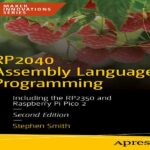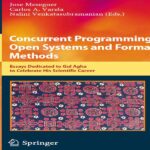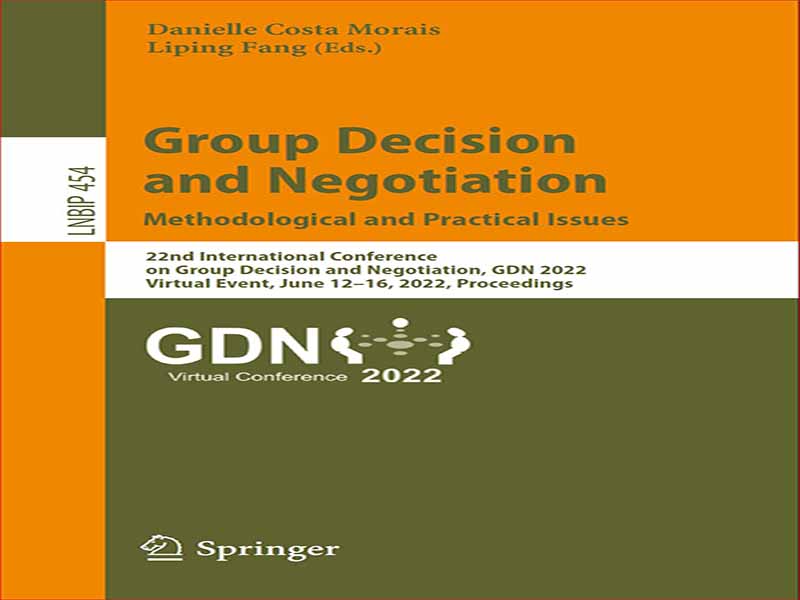- عنوان کتاب: Group Decision and Negotiation / Methodological and Practical Issues
- نویسنده/انتشارات: Danielle Costa Morais
- حوزه: مذاکره
- سال انتشار: 2022
- تعداد صفحه: 133
- زبان اصلی: انگلیسی
- نوع فایل: pdf
- حجم فایل: 5.14 مگابایت
مجموعه کنفرانسهای بینالمللی درباره تصمیمگیری و مذاکره گروهی (GDN) یک مکان محرک برای انتشار آخرین تحقیقات در مورد تئوری و عمل تصمیمگیری و مذاکره گروهی فراهم کرده است. شرکت کنندگان کنفرانس به تبادل نظر، بحث و نقد آخرین ایده های خود در زمینه GDN می پردازند. کنفرانس GDN از سال 2000 هر ساله با دو استثنا برگزار می شود: 2000 (گلاسکو، انگلستان)، 2001 (لاروشل، فرانسه)، 2002 (پرت، استرالیا)، 2003 (استانبول، ترکیه)، 2004 (بانف، کانادا)، 2005. (وین، اتریش)، 2006 (کارلسروهه، آلمان)، 2007 (مونت ترمبلانت، کانادا)، 2008 (کویمبرا، پرتغال)، 2009 (تورنتو، کانادا)، 2010 (دلفت، هلند)، 2011 (لغو شده)، 2012 (لغو) ریسیف، برزیل)، 2013 (استکهلم، سوئد)، 2014 (تولوز، فرانسه)، 2015 (ورشو، لهستان)، 2016 (بلینگهام، ایالات متحده آمریکا)، 2017 (اشتوتگارت، آلمان)، 2018 (نانجینگ، چین)، 2019 (Loughbor) ، انگلستان)، 2020 (تورنتو، کانادا – کنفرانس به دلیل همه گیری کووید-19 لغو شد و اقدامات منتشر شده) و 2021 (کنفرانس مجازی به میزبانی تورنتو، کانادا). بیست و دومین کنفرانس بین المللی تصمیم گیری و مذاکره گروهی (GDN 2022) به صورت مجازی (آنلاین) طی 12 تا 16 ژوئن 2022 برگزار شد. در مجموع 68 مورد ارسالی دریافت شد که شامل 9 جریان اصلی مرتبط با حوزه GDN بود. پس از یک فرآیند بررسی دقیق و کامل که شامل کار بسیاری از داوران بود، 9 مقاله از این مقالات ارسالی برای انتشار در این جلد با عنوان “تصمیم گیری و مذاکره گروهی: مسائل روش شناختی و عملی” انتخاب شدند. نه مقاله منتشر شده در این جلد در سه بخش سازماندهی شدهاند که نشاندهنده انواع موضوعات روششناختی و عملی مورد بحث در GDN 2022 است: • بخش اول در مورد «مدلسازی ترجیحی برای تصمیمگیری و مذاکره گروهی» شامل چهار مقاله است. کارپوف و همکاران مدل هتلینگ داونز را در سه جهت بسط دهید: تجزیه و تحلیل رقابت تحت انواع قوانین رای گیری، در نظر گرفتن حوزه دایره ای و نه فقط خطی، و گسترش نتایج به تنظیمات برنده همه چیز. کوریا و همکاران تجزیه و تحلیل عملکرد یک پروتکل استخراج اولویت برای مذاکرات چند موضوعی بر اساس روش تجارت انعطافپذیر و تعاملی (FITradeoff) از طریق آزمایشهای شبیهسازی. سوزوکی و هوریتا دو رویکرد را برای بررسی چگونگی دستیابی به تخصیص بهینه پارتو جهانی از روبات ها (اشیاء تقسیم ناپذیر) بر اساس مشخصات ترجیح محلی ارائه می دهند. Roselli و de Almeida مدولاسیون ارائه شده توسط روش FITradeoff را از مطالعات رفتاری انجام شده با استفاده از ابزارهای علوم اعصاب انجام شده به دو روش توصیف می کنند: مدولاسیون در فرآیند مدل سازی ترجیحی و مدولاسیون در سیستم پشتیبانی تصمیم گیری FITradeoff (DSS). • بخش دوم این جلد از سه مقاله مرتبط با «حل تعارض» تشکیل شده است. سوزوکی و لئونتی روشی را برای حل مسئله انتخاب تعادل عمومی با استفاده از ساختار سطح آمتا پیشنهاد میکنند، که در آن فرض میشود هر بازیکن تعادلی را به عنوان اصل رفتار خود انتخاب میکند و خود چنین انتخابی بازی دیگری را میسازد. فیلپات و همکاران از مدل نموداری برای حل تعارض (GMCR) برای بررسی تضاد بر سر گسترش معدنکاری کل در آبخوان آلیستون در شهر تینی، انتاریو استفاده کنید و طبقه رو به رشدی از تضاد منابع چند صلاحیتی را روشن کنید. شارما و همکاران استفاده از مفاهیم وابستگی مسیر و نقاط اهرمی را برای درک بهتر مناقشه پیچیده رودخانه کووری مورد بحث قرار دهید و موثرترین نقاط اهرمی را توصیه کنید، از جمله تغییر قوانین سیستم و همچنین پارادایمی که سیستم از آن ناشی می شود. • آخرین بخش در “فرایندهای تصمیم گیری مشارکتی” شامل دو مطالعه در مورد فرآیندهای مختلف تصمیم گیری استراتژیک است. تاناکا و همکاران از تجزیه و تحلیل احساسات برای استخراج نظرات مثبت، منفی و خنثی ارسال شده در سایت های خبری استفاده کنید تا با محاسبه میزان تایید نظرات مردم، فضای اجتماعی را تجسم کنید. این روش با تجزیه و تحلیل پست های مربوط به COVID-19 نشان داده شده است. گرچک روش خرید و فروش انحلال مشارکت های دو طرفه را به انحلال مشارکت های سه جانبه گسترش می دهد.
The series of International Conferences on Group Decision and Negotiation (GDN) have furnished a stimulating venue for the dissemination of the latest research on the theory and practice of group decision and negotiation. Conference participants exchange, discuss, and critique their latest ideas in the field of GDN. The GDN conference has been held annually since 2000 with two exceptions: 2000 (Glasgow, UK), 2001 (La Rochelle, France), 2002 (Perth, Australia), 2003 (Istanbul, Turkey), 2004 (Banff, Canada), 2005 (Vienna, Austria), 2006 (Karlsruhe, Germany), 2007 (Mont Tremblant, Canada), 2008 (Coimbra, Portugal), 2009 (Toronto, Canada), 2010 (Delft, The Netherlands), 2011 (cancelled), 2012 (Recife, Brazil), 2013 (Stockholm, Sweden), 2014 (Toulouse, France), 2015 (Warsaw, Poland), 2016 (Bellingham, USA), 2017 (Stuttgart, Germany), 2018 (Nanjing, China), 2019 (Loughborough, UK), 2020 (Toronto, Canada—conference cancelled because of the COVID-19 pandemic and proceedings published), and 2021 (virtual conference hosted from Toronto, Canada). The 22nd International Conference on Group Decision and Negotiation (GDN 2022) took place virtually (online) during June 12–16, 2022. A total of 68 submissions were received, encompassing nine main streams related to the field of GDN. After a careful and thorough review process involving the work of many reviewers, nine papers from those submissions were selected for publication in this volume entitled “Group Decision and Negotiation: Methodological and Practical Issues.” The nine papers published in this volume are organized into three sections, representing the variety of methodological and practical issues discussed at GDN 2022: • The first section on “Preference Modeling for Group Decision and Negotiation” consists of four papers. Karpov et al. extend the Hotelling-Downs model in three directions: analyzing competition under a variety of voting rules, considering the circular domain and not just the linear, and extending the results to the winner-take-all setting. Correia et al. analyze the performance of a preference elicitation protocol for multi-issue negotiations based on the Flexible and Interactive Tradeoff (FITradeoff) method through simulation experiments. Suzuki and Horita present two approaches to explore how to reach a global Pareto optimal allocation of robots (indivisible objects) based on the local preference profile. Roselli and de Almeida describe modulation provided by the FITradeoff method from behavioral studies performed using neuroscience tools conducted in two ways: modulation in the preference modeling process and modulation in the FITradeoff Decision Support System (DSS). • The second section of this volume is composed of three papers related to “Conflict Resolution.” Suzuki and Leoneti propose a way to solve the general equilibrium selection problem by means of ameta-level structure, in which each player is assumed to select an equilibrium as their principle of behavior and that such a selection itself makes another game. Philpot et al. use the Graph Model for Conflict Resolution (GMCR) to investigate conflict over expanding aggregate mining at the Alliston Aquifer in the Township of Tiny, Ontario, shedding light on a growing class of multijurisdictional resources conflict. Sharma et al. discuss the use of the concepts of path dependency and leverage points to better understand the complex Cauvery River dispute and recommend the most effective leverage points, including changing the rules of the system as well as the paradigm out of which the system arises. • The last section on “Collaborative Decision Making Processes” contains two studies of different strategic decision processes. Tanaka et al. apply sentiment analysis to extract the positive, negative, and neutral comments posted on news sites to visualize the social atmosphere by calculating the approval rating of the people’s comments. The methodology is demonstrated by analyzing postings regarding COVID-19. Gerchak extends the buy-sell procedure of dissolving two-party partnerships to dissolve threeparty partnerships.
این کتاب را میتوانید از لینک زیر بصورت رایگان دانلود کنید:
Download: Group Decision and Negotiation




































نظرات کاربران